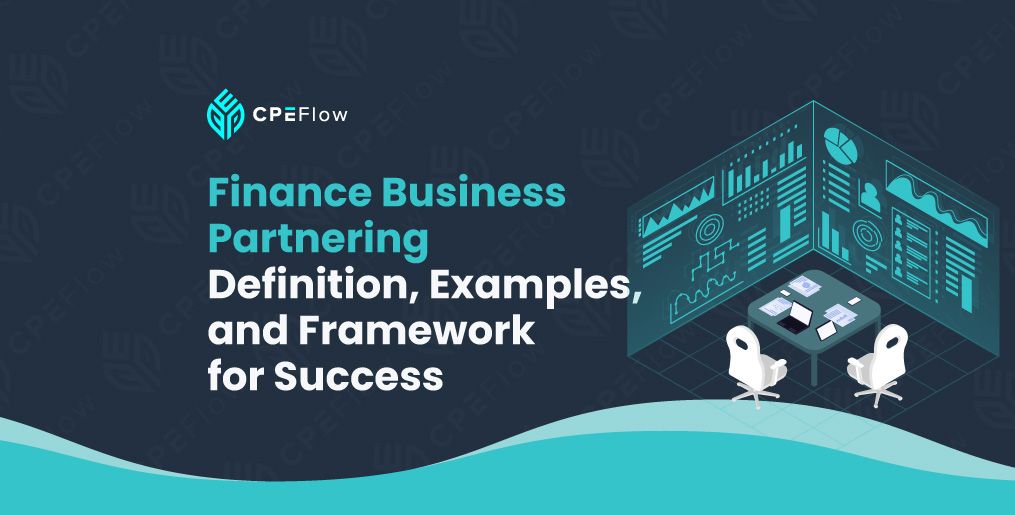As the business world becomes more competitive, finance professionals are expected to continually upskill and expand their capabilities.
Finance teams are no longer just crunching numbers or buried in spreadsheets and reports behind the scenes. Instead, they’re now expected to play a far more strategic role by partnering with other departments to support better decision-making and drive business growth.
This is where finance business partnering comes into the picture. It’s all about working closely with other teams across the organization, ensuring they have the financial insights and data needed to make good decisions that move the company closer to its goals.
If you’re looking to step into this critical role, check out
CPE’s Finance Business Partnering course. Throughout this course, you’ll learn the best practices and framework for success as a finance business partner.
A finance business partner (FBP) is a finance professional who works closely with other departments, such as operations, marketing, sales, or HR, to provide financial insights and advice that help key leaders make better-informed decisions.
So, instead of sitting on the sidelines, finance professionals have the opportunity to take on a more strategic role. The goal here is to use the company’s financial performance and historical data to guide its overall strategy.
For instance, finance business partners may collaborate with the operations team to improve efficiency and reduce costs. They might support the marketing team by analyzing the return on investment (ROI) of various campaigns. Additionally, partnering with the HR team enables them to provide valuable insights into salary budgeting, staff expenses, and adjusting compensation packages to account for inflation.
In short, finance business partners act as a bridge between the finance department and the rest of the business, helping to drive better performance rather than just track it.
A finance business partner’s role is all about supporting the company as a whole with actionable financial insights and guidance.
While the exact responsibilities can vary by company and industry, they typically include:
- Supporting financial planning: Finance business partners may assist in budgeting, forecasting, and long-term financial planning to ensure all departments are aligned with the company's strategic goals.
- Providing insights for better decision-making: They can transform complex financial data into clear, actionable insights and identify trends, opportunities, and risks that impact business performance.
- Collaborating and presenting findings: These professionals will work closely with department heads and key leaders to explain financial results and present their recommendations.
- Reviewing financial statements and ensuring compliance: Finance business partners can also assume the traditional roles of a finance team, such as analyzing financial performance, reviewing key reports, and ensuring that financial practices comply with regulations and accounting standards.
Finance business partners require a combination of hard and soft skills to effectively carry out the roles and responsibilities outlined above. Examples of these skills include data analytics, accounting knowledge, communication, and strategic thinking, all of which are critical for success.
Get Exclusive Access & Special Discounts!
Get early bird access to new CPE courses and exclusive discounts only shared with our email subscribers.
The QUIET framework provides a clear and structured approach to developing the skills and mindset to succeed as a finance business partner. This framework can help finance professionals build strong relationships, communicate effectively, and deliver powerful insights that will drive their company's growth.
Let's break down the QUIET approach as per below.
To consistently deliver high-quality work, you need to manage and prioritize your workload effectively.
This often means delegating tasks where appropriate, knowing how to leverage each team member's strengths, and optimizing your team's resources to focus on tasks that add the most value.
Becoming a finance business partner requires a deeper understanding of your company. This calls for a shift from a traditional accounting mindset to a strategic business perspective.
You'll need to take the time to understand a company’s operations and adapt your communication style to get on the same wavelength as different stakeholders and leaders.
Doing so allows you to deliver stronger, more accurate insights and ensures your message resonates more powerfully with people from different backgrounds and departments.
Your day-to-day tasks might involve financial modeling, forecasting, and budgeting, but you’ll move beyond simply reporting numbers to focus on additional skills like
financial storytelling and delivering structured presentations.
As a finance business partner, you'll need these skills to convert raw data into meaningful insights that can inspire action and influence business decisions.
To succeed, you need a mindset rooted in collaboration, curiosity, and simplicity. You need to devise win-win solutions for all parties or translate complex financial concepts into clear, business-friendly language.
It also helps to build a solid response framework, so you’re ready to tackle just about any business question under the sun with confidence.
Building and maintaining trust is the foundation of any successful finance business partnership. Trust allows you to influence effectively, foster open communication, and create lasting relationships that drive business success.
In CPE’s Finance Business Partnering course, we’ll take you through practical steps to analyze stakeholders, plan effective engagement, and build credibility and trust in your collaborations.
You’ll also learn how to apply every step of the QUIET framework so you can confidently adopt it and excel in your role.
You can expect to encounter various challenges as a finance business partner. Understanding the potential hurdles you may face can help you prepare for and navigate them more effectively.
Here are some common challenges linked to business partnering in finance:
- Time management: Finance business partners often have to juggle their routine financial duties with other strategic tasks, such as collaborating with unit leaders or preparing financial analyses and presentations. This might lead to challenges with managing time and prioritizing tasks.
- Communicating complex financial data: Translating technical finance information into clear, actionable insights that other professionals can understand can be very challenging.
- Adapting to different stakeholder needs: Every department has varying priorities and communication styles. Finance partners must be flexible and possess a broad understanding of the company to engage and build trust with these different teams.
- Handling rapid change: Finance business partners must be comfortable working with incomplete information and adapting their analyses quickly as new data emerges.
Excelling as a finance business partner isn't easy. This will take much more than mastering spreadsheets or financial reports. Instead, you will need to focus on building strong relationships, communicating insights that drive action, and establishing yourself as a trustworthy partner to leaders across various departments.
While it may be challenging, it is not impossible. By adopting the right mindset, focusing on collaboration, and applying frameworks like QUIET, finance professionals can grow and thrive as trusted advisors and leaders.
If you’re ready to take on this role,
CPE’s Finance Business Partnering course will equip you to excel in it through expert-crafted frameworks like QUIET. Plus, you can learn at your own pace and from anywhere, all while earning NASBA-approved CPE credits!

Nathan Liao, CMA
Empty space, drag to resize
Nathan Liao, a Certified Management Accountant, educator, and influential business figure in the accounting industry, has dedicated over a decade to supporting more than 82,000 accounting and finance professionals in their pursuit of the CMA certification. As the visionary founder of CMA Exam Academy and CPE Flow, Nathan is committed to delivering premier online training solutions for the next generation of accounting and finance professionals.


